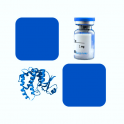
- Remove this product from my favorite's list.
- Add this product to my list of favorites.
Products
Newsletter
 |  |  |  |  |  |

Background
EpCAM is also known as CO171A,; EGP; EGP40; GA7332; KSA; M4S; MIC18; MK1; TROP1; hEGP2, and is a pan-epithelial differentiation antigen that is expressed on almost all carcinomas as 17-1A(mAb) antigen. Its constitutional function is being elucidated. It is intricately linked with the Cadherin-Catenin pathway and hence the fundamental WNT pathway responsible for intracellular signaling and polarity. The epithelial cell adhesion molecule (Ep-CAM) is known to express in most epithelial malignancies and was reported as a tumor marker or a candidate of molecular targeting therapy. Ep-CAM cross signaling with N-cadherin involves Pi3K, resulting in the abrogation of the cadherin adhesion complexes in epithelial cells was reported. And Epithelial cell adhesion molecule (Ep-CAM) recently received increased attention as a prognostic factor in breast cancer.
Source
Recombinant Rhesus macaque EpCAM / TROP1 Protein (Rhesus macaque EpCAM), His Tag (EPM-C5227) is expressed from human 293 cells (HEK293). It contains AA Gln 24 - Lys 265 (Accession # Q1WER1).
Predicted N-terminus: Gln 24
Molecular Characterization
This protein carries a polyhistidine tag at the C-terminus.
The protein has a calculated MW of 28.2 kDa. The protein migrates as 33-40 kDa under reducing (R) condition (SDS-PAGE) due to glycosylation.
Endotoxin
Less than 1.0 EU per μg by the LAL method.
Purity
>95% as determined by SDS-PAGE.
Formulation
Lyophilized from 0.22 μm filtered solution in PBS, pH7.4. Normally trehalose is added as protectant before lyophilization.
Reconstitution
See Certificate of Analysis for reconstitution instructions and specific concentrations.
Storage
For long term storage, the product should be stored at lyophilized state at -20°C or lower.
Please avoid repeated freeze-thaw cycles.
This product is stable after storage at:
-20°C to -70°C for 12 months in lyophilized state;
-70°C for 3 months under sterile conditions after reconstitution.
(1) "Dual-Recognition-Mediated Autocatalytic Amplification Assay for the Subpopulations of PD-L1 Positive Extracellular Vesicle"
Ren, Ge, Tang et al
Anal Chem (2024)
(2) "Flexible DNA Nanoclaws Offer Multivalent and Powerful Spatial Pattern-Recognition for Tumor Cells"
Chen, Mao, Huo et al
ACS Appl Mater Interfaces (2024)
(3) "The role of family history in predicting germline pathogenic variant carriers who develop pancreatic cancer: Results of a multicenter collaboration"
Karloski, Dudley, Diergaarde et al
Cancer (2024)
Showing 1-3 of 10138 papers.
Follow us